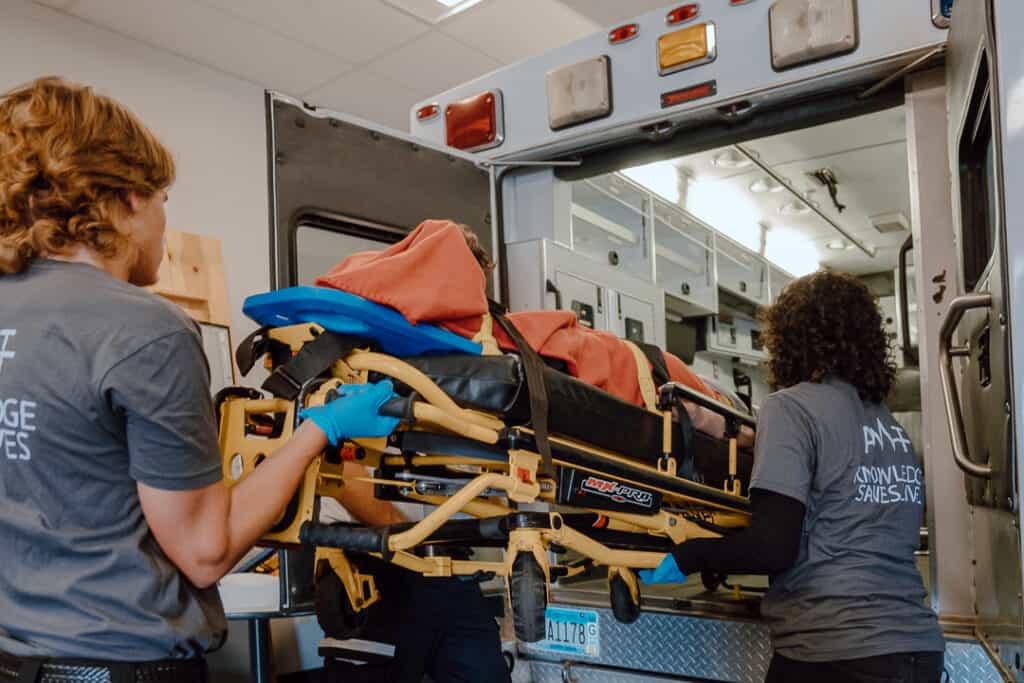
The first time I was involved in a major trauma case, I was an undergraduate intern on my first night on the surgical service. I was paged to the ED for a victim of a motor vehicle accident. I arrived to the stabilization room with the rest of the team. My role would be assisting in IV access.
The patient arrived. He was immobilized on a spine board with C-collar. BVM and compressions where being carried out by paramedics. He had one IV at this point. He was very pale and diaphoretic in appearance. The team quickly went to work. The nurses began cutting away all his clothing with trauma shears. The anesthetist placed an endotracheal tube.
Attempts were made to start additional lines. I was directed to perform a cut down to access a vein on his foot. I somehow managed to do this, despite the fact it was my first one and my hands were shaking. I took turns with the paramedics performing chest compressions. I felt the chest move without resistance, indicating multiple broken ribs, typical after prolonged CPR.
Fluids and type specific blood were being infused through multiple lines. The trauma surgeon made the decision to cut open the patient’s chest to perform cardiac massage. A large amount of blood gushed out, and he placed his hand inside the patient’s chest, discovering complete disruption of major vessels. The resuscitation was called off and the patient pronounced dead.
I had been asked to retrieve the patient’s wallet to get his ID. I looked at his driver’s licence. It was the same person, but very different. The picture indicated life, a personality, a name. It was a realization that is hard to describe. He was my age. Yet here he was laying before us, nude, covered with bits of glass and blood, lines inserted everywhere, with an endotracheal tube in place. His blood was dark, congealing on the floor around the stretcher.
I went back to my call room. Even though I had worn gloves and washed, I could still feel the sensation of his bare, broken chest under my hands as I lay in the dark, unsuccessfully trying to sleep.
The next morning I noticed splatters of blood on my scrubs. I again felt that odd emotional experience of witnessing a traumatic death. Gradually, the demands of internship caused me to compartmentalize these experiences in order to cope. I became an expert who could wall off my emotions to do what I needed to do for the patient, then ruminate about it later when I had time. Doctors, nurses, and EMS, police, and fire personnel have all felt this. I think this gives us some sense of brotherhood, a shared reality.
Even though we are able to suppress our emotional response at will, we must retain our caring attitude. Having witnessed plenty of traumatic deaths and patients dying of chronic diseases, it is easy to become callous to everyday concerns of patients. Remember, most people have no barometer to measure their suffering. Concerns that seem trivial to us, are not to them. Maintain your empathy. Don’t let your emotional control cause you to lose your humanity; rather, let these experiences enhance your empathy to the human condition.
The patient arrived. He was immobilized on a spine board with C-collar. BVM and compressions where being carried out by paramedics. He had one IV at this point. He was very pale and diaphoretic in appearance. The team quickly went to work. The nurses began cutting away all his clothing with trauma shears. The anesthetist placed an endotracheal tube.
Attempts were made to start additional lines. I was directed to perform a cut down to access a vein on his foot. I somehow managed to do this, despite the fact it was my first one and my hands were shaking. I took turns with the paramedics performing chest compressions. I felt the chest move without resistance, indicating multiple broken ribs, typical after prolonged CPR.
Fluids and type specific blood were being infused through multiple lines. The trauma surgeon made the decision to cut open the patient’s chest to perform cardiac massage. A large amount of blood gushed out, and he placed his hand inside the patient’s chest, discovering complete disruption of major vessels. The resuscitation was called off and the patient pronounced dead.
I had been asked to retrieve the patient’s wallet to get his ID. I looked at his driver’s licence. It was the same person, but very different. The picture indicated life, a personality, a name. It was a realization that is hard to describe. He was my age. Yet here he was laying before us, nude, covered with bits of glass and blood, lines inserted everywhere, with an endotracheal tube in place. His blood was dark, congealing on the floor around the stretcher.
I went back to my call room. Even though I had worn gloves and washed, I could still feel the sensation of his bare, broken chest under my hands as I lay in the dark, unsuccessfully trying to sleep.
The next morning I noticed splatters of blood on my scrubs. I again felt that odd emotional experience of witnessing a traumatic death. Gradually, the demands of internship caused me to compartmentalize these experiences in order to cope. I became an expert who could wall off my emotions to do what I needed to do for the patient, then ruminate about it later when I had time. Doctors, nurses, and EMS, police, and fire personnel have all felt this. I think this gives us some sense of brotherhood, a shared reality.
Even though we are able to suppress our emotional response at will, we must retain our caring attitude. Having witnessed plenty of traumatic deaths and patients dying of chronic diseases, it is easy to become callous to everyday concerns of patients. Remember, most people have no barometer to measure their suffering. Concerns that seem trivial to us, are not to them. Maintain your empathy. Don’t let your emotional control cause you to lose your humanity; rather, let these experiences enhance your empathy to the human condition.


